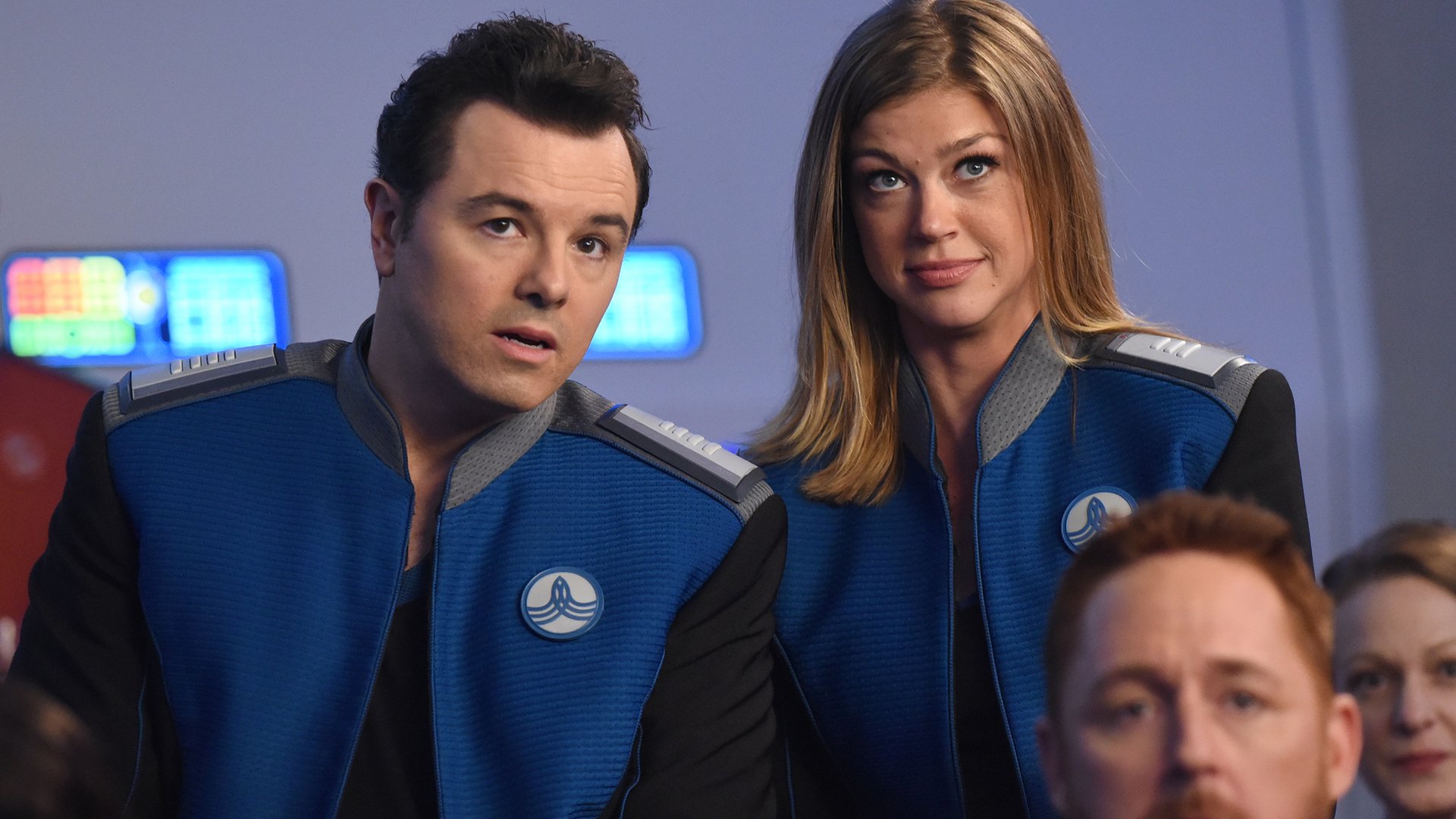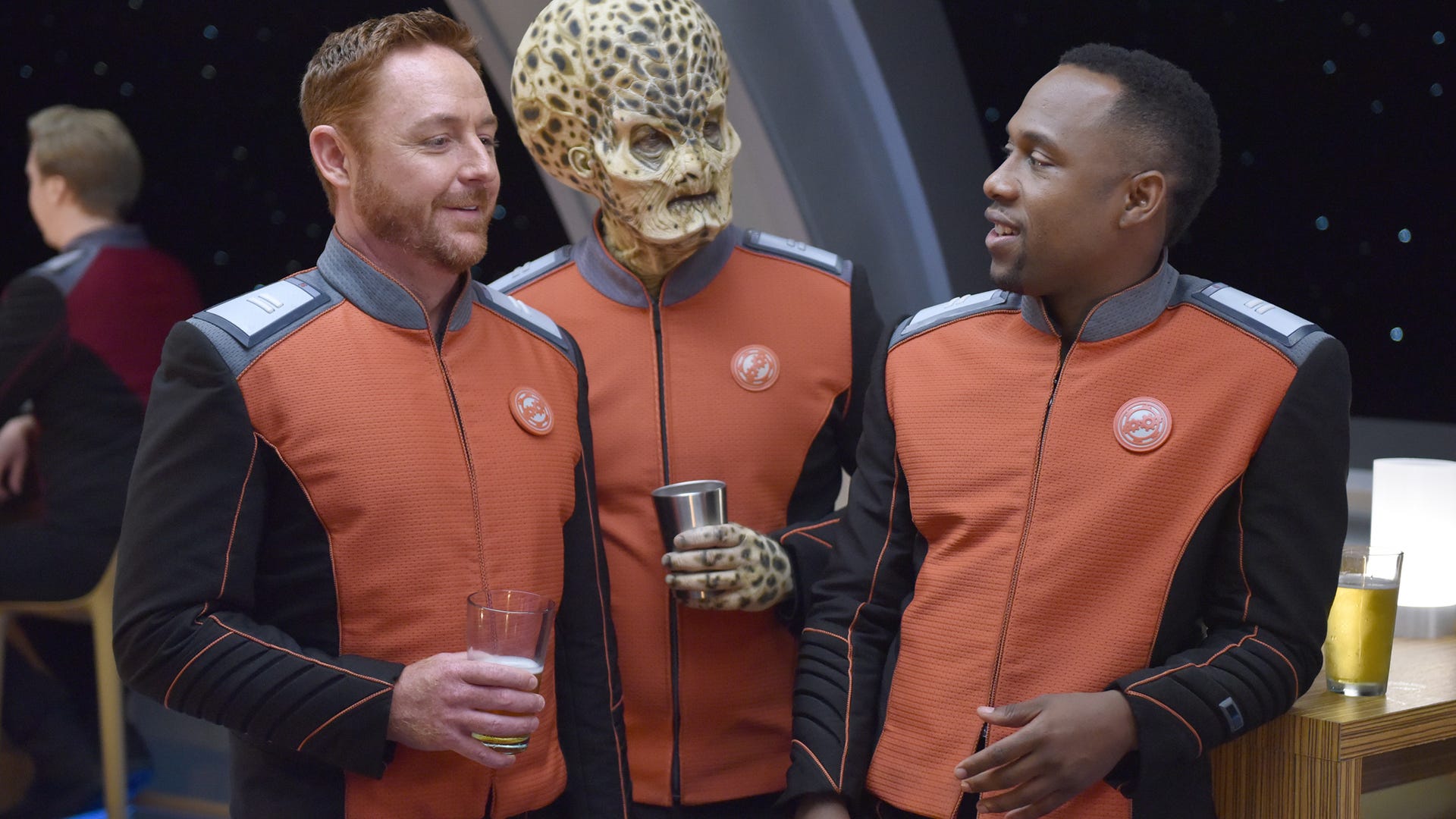Join or Sign In
Sign in to customize your TV listings
By joining TV Guide, you agree to our Terms of Use and acknowledge the data practices in our Privacy Policy.
The Curious Case of The Orville: Why Critics Hate It But Fans Love It
Is it too much of a throwback?
On first read, the early descriptions of Fox's The Orville sounded like a great idea. A space comedy by Seth MacFarlane in the vein of Galaxy Quest was something that was missing from the glut of TV science-fiction (with apologies to Yahoo's belated Other Space), frequently dominated by straight-faced takes about the future or superheroes absorbed with an internal struggle of responsibility.
But in reality, The Orville was something different. It wasn't a parody of Star Trek: The Original Series, it was a loving homage to it by a fan. That fan just so happens to be a guy who has made millions for Fox with gross-out humor and who not-so-tastefully sang a song at the Oscars about actress' boobs. The Orville wasn't the show we thought it was going to be, and that came as big suprise since MacFarlane's reputation is one that includes horny teddy bears.
Critics were probably the most shocked. They got first crack at early episodes of The Orville, and the reaction was overwhelmingly negative. Actually, it wasn't just your typical bad review, it was worse. Critics were confused.
"[MacFarlane isn't] able to set the right tone for the show," Variety's Mo Ryan said in her review. "Of course, that would be difficult for anyone, given The Orville's inconsistency about what it wants to be. It tries to be light and comedic, except when it's a morality play or an action hour or a hangout comedy set in space."

Seth MacFarlane, Adrianne Palicki; The Orville
Michael Becker/FoxRyan's sentiments played like a broken record in negative reviews as MacFarlane's jokes about alien pee or synthesized pot brownies bookending life-or-death situations was the most common beef. The Orville wasn't a comedy and it wasn't a drama. It seemed The Orville had set a course for disaster.
But once the show actually premiered to TV audiences, we were immediately reminded us that what critics think doesn't mean much when it comes to a show's success. On the reviews aggregator Metacritic, The Orville has a critics' metascore of 36 out of 100. By contrast, Metacritic users have given the show a sturdy 8.2 out of 10, making it the highest-rated new fall broadcast show as considered by the populace at large. On Rotten Tomatoes, the disparity is even greater. Critics there have given The Orville a 21% fresh rating, better only than CBS' 9JKL (13%) and ABC's Marvel's Inhumans (8%) from the batch of new fall broadcast shows. Yet viewers have given it a 93% fresh rating, once again the highest user score of all the new broadcast shows. And that's not just the opinions of a few dozen viewers. That score is made from almost 6,000 reader reviews, which is almost 5,000 more than the new show with the next most user reviews. In short, viewers appear to love The Orville and can't wait to tell people about it, while critics appear to hate it.
The Orville Beams Its Way to a Second Season
"I kind of compare it to the popular vote and the electoral college," Peter Macon, who plays the alien Commander Bortus in The Orville, told TV Guide. "Critics have their own set of issues that they bring, but the fans ultimately are the ones who are going to decide -- the fans are the ones that are watching, the fans give critics jobs, the fans give us jobs. I wasn't really bummed by what the critics had to say because I knew there was a lot more that was coming."
The truth is, The Orville was never going to win over critics because it's a throwback and goes against everything modern television is. As a critic, I know that a show's sense of identity can directly correlate to whether I think it's good or not; with so much TV out there, and typically, when show doesn't seem to know what it is, it's not going to get very far. But The Orville, seems to be a very different case. It's not that The Orville doesn't know what it wants it to be, as critics assume, it's that it wants to be a little bit of everything.
"Seth's plan was always -- he didn't want anyone to know what the show was," showrunner David A. Goodman told TV Guide before the show's premiere. "So there are episodes that are very comedic, and there are episodes that are very dramatic. Because we're out in the universe and it takes place in the future, you've got a whole variety of stories you can tell and we're not going to limit ourselves into a cookie cutter idea of what the show is."

Scott Grimes, Mike Henry, J Lee; The Orville
Michael Becker/FoxThat's an ambitious (and dangerous) strategy, but fan reviews cite that as a reason they like the show. It's a mystery box that the same ragtag group of space adventurers opens each week. Before we had five times more channels and streaming options than just episodes of TOS, old-school television wasn't boxed into niche genres and a show like Star Trek could be about everything. The Orville just wants to emulate that.
"I was disappointed because I thought I was correct in what I liked about the show, which was that it was new," Scott Grimes, who plays MacFarlane's character's good pal Gordon, told TV Guide. "It was a smell, a feeling that I've never seen on television before, it was a throwback. But also it was paving new ground in television that only Seth MacFarlane understands."
For fans, that newness through it's ability to remix a little bit of everything may be exactly what they're looking for. With streaming services crowding the TV space with new series every week, new shows need to stick out in some way to survive, and The Orville is a show that defies trends, for better or worse. It's not another show about a murder investigation, it's not about a doctor who's outstanding in their field but whose personal life is a mess and it's not about a person with special powers.
The Orville's Season Will Be Cut Short
And because one scene of The Orville can feature a gag about aliens singing the Titanic soundtrack and U-turn to discussion of the destruction of entire planets and species, it also appeals to two groups of fans who can show up in droves, tone be damned -- the growing number of proud self-professed sci-fi geeks and the reliable fans of low-brow comedy.
"It appeals to a wider interest level, we're appealing to people who like Family Guy and satire and subversive television," Macon explains. "And that person who loves straight science fiction and goes to Comic Con, so we're trying to hit that target audience and I think we have. We're bringing in a whole groups of people who would normally not be in the same boat watching the same shows."
It's just that those people aren't critics. Not that The Orville would want it any other way. Fox gave it the first in-season second-season order (Will & Grace was given a second season before it premiered) of all the new shows, meaning that it's going to be around for a while, whether critics like it or not. And that will make fans happy.
The Orville airs Thursday nights at 9/8c on Fox. The Season 1 finale is scheduled for Dec. 7.
